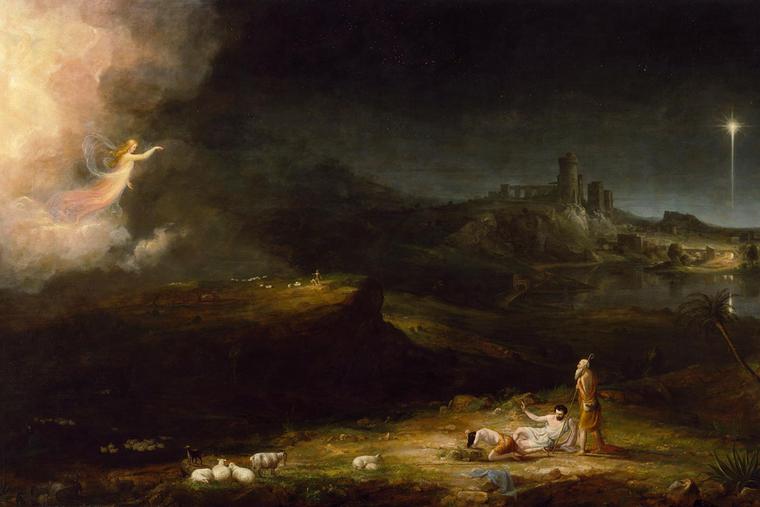Peace to People of Good Will
In a year of increasingly divided public discourse, Catholics should take to heart the angelic message of “peace to people of good will.”

Over the course of 2020, all sorts of factions have developed. Within alumni groups, within parish-base groups, groups of moms, groups of families, professional groups, amateur clubs, relatives — few of us can name a single group to which we belong that hasn’t seen itself become a house divided.
Two friends, their new animosity based on some series of events and remarks to which one is seldom fully privy, eviscerate one another on social media. People drop out of social networks and group texts in order to stay out of these dogfights. Almost everyone makes the occasional comment that is later regretted.
To make matters worse, Confession can be harder to find these days, which is a pity, since it’s more necessary now than ever.
Toward the beginning of December I found a church holding confessions, and was edified by the long line — at least 60 people before and behind me. When I got up to the priest (one of four stationed outdoors in the chill breeze) suggested making a spiritual bouquet for the Infant Jesus: do a kind deed for someone every day, and by Christmas have twenty-odd kind deeds to offer the babe in the manger.
It was a new spin on an old idea but something clicked when I, an adult, was given a suggestion usually reserved for catechizing children. This is what we need this Christmas. We need more kind deeds. Specifically, we need to do more kind deeds for our enemies, especially when those enemies were our friends only a few short years or months ago.
I am not suggesting — far be it from me to suggest — that we should pretend that someone is right when they are wrong. Charity does not require that we should cease to speak the truth. But the search for truth that has dominated public discourse for the last year especially has been so distinctly lacking in charity that truth itself has suffered. After all, the more desperately one is convinced of the truth, and the more aware one is that others are dangerously wrong, the greater one’s willingness to argue kindly — yes, even when the other side’s position seems false, stupid and dangerous — for since when have insults ever convinced anyone that they are wrong?
So it behooves those of us who love the truth to be kind, even for the very truth’s sake. But neither ought we to forget, this time of year especially, that “the greatest of these is charity” (1 Corinthians 13:13). Our place in heaven is not set by intelligence, by the number of times one was right in a Facebook argument or by the number of people won over from the dark side of falsehood (and yes, I think there is a dark side). Our place in heaven is set by how great our love of God and neighbor is. And that love is never served, however wrong and even dangerous an opponent may be, by calling them “Thou Fool” (see Matthew 5:22).
When we become so certain of our certitude, we forget that the human mind is imperfect; it behooves us now especially to remember that the angels themselves, whose intellects so far surpass our own, spent Christmas night and morn wishing — to shepherds who, if stereotypes have purchase across the ages, may not have been the most brilliant men in Palestine — “on earth peace to men of good will” (Luke 2:14). Not to the right men, not to bright men, but to “men of good will.”
The argument over translating that phrase is old. American Catholics saw it transform in the Gloria from “Peace to [God’s] people on earth” to “on earth peace to people of good will,” a modification that returned to the Vulgate: et in terra pax hominibus bonae voluntatis. The King James Bible rendered it as “on earth peace, good will toward men,” arguably a mistranslation of the Greek. The KJV suggests a universal peace; the old Gloria translation suggests one confined to God’s people; the Vulgate and the new Gloria translation suggest something limited but indefinable: peace to those of good will, whoever they are.
It is tempting to assume we can recognize when another person is of good will, and base our own behavior on that assessment of their intentions. “They don’t mean well. So-and-so would only take advantage of a fair fight. They’re arguing in bad faith.” Translation: They lack good will.
And indeed, one must be prudent: if in your best judgment a given person is not of good will — don’t expect to change their mind, don’t hand them your car keys, don’t invite them over for Christmas dinner. Well and good. But at the end of the day, your judgment that they lack good will is just that: a personal, fallible judgment. Maybe what seemed like spectacularly bad faith to you was fear, anger or simple (albeit misplaced) confidence. Maybe they thought you were the one with bad faith. And there is nothing on earth or in heaven that says that because God knows whose will is good and whose is not, and bestows his peace accordingly, that we have the right to withhold our peace — our Christmas cards, our friendly text or email, our smile and wave — from those who seem to need it most.
After all, if we are all in favor of the peace that follows good will, there is no better way to encourage its spread than by increasing the good will in our own hearts, no matter how tired, dark and discouraged we have become this past year.
- Keywords:
- Christmas















